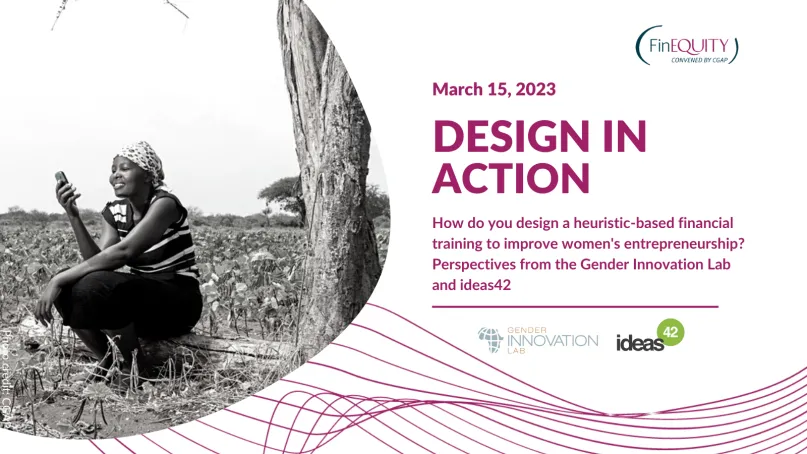Design in Action – How Do You Design a Heuristic-Based Financial Training to Improve Women’s Entrepreneurship?

The second webinar in the ‘Design in Action’ series focused on the work of the World Bank’s Africa Gender Innovation Lab (GIL) to design financial heuristics for rural women in Ethiopia. Noting the challenges of classroom based financial literacy initiatives, and their often-limited impact, together with ideas42, they piloted a mobile phone-based financial training to 3,000 women in Ethiopia. The preliminary results, collected through a randomized-control trial (RCT), have offered some surprising and encouraging initial findings, which GIL shared during this webinar.
Additionally, ideas42, who have now piloted this training in four countries (India, Dominican Republic, Philippines, and Ethiopia), (see a short video here) also discussed the importance of contextualizing research, and how this is then translated into design for women across these markets. Their approach has centered around two key components:
-
Content: Simplifying financial concepts into easy to understand and apply heuristics, and relatable lessons by including locally relevant examples.
-
Delivery: The Interactive Voice Response (IVR) platform circumvents the need for in-person contacts.
This session highlighted the FinEquity Gender-Intelligent Design Knowledge Guide, introduced members to heuristics and examining the process, and explored the opportunity that these easy-to-implement rules of thumb may offer for low-literacy women.
About this event
Online

Adiam Hagos Hailemicheal
Adiam Hagos Hailemicheal is an Economist working with the Africa Region Gender Innovation Lab at the World Bank Group. Adiam has over thirteen years of experience in development research, mainly focusing on women’s economic empowerment and childhood development. She works on a portfolio of research projects on entrepreneurship, wage employment, land tenure, childcare, and adolescent development. Adiam is a focal person for the Gender Innovation Policy Initiative for Ethiopia – AGIL’s country-level lab. In addition to her research work program, Adiam coordinates GIPIE’s policy engagement in Ethiopia.

Manasee Desai
Manasee Desai is a Vice President at ideas42 where she co-leads the organization’s Financial Health work, which applies tools from behavioral science to the design of financial products and programs for underserved and underrepresented populations. Over the past 17 years, she has advised a variety of banks, fintechs, governments, non-profits, and insurance companies in the US, Africa, and Asia on behavioral and data-driven strategies for product refinement and growth. She has also conducted research on financial inclusion, entrepreneurship, and gender equity with academics at Harvard, MIT, and Yale. Manasee founded and leads the Behavioral Evidence Hub (Bhub.org) which serves as a global repository of proven applications of behavioral design tools to improving social impact outcomes. She is a lead author on multiple ideas42 publications relating to the application of behavioral science to financial services and gender equity. She has a BA in Political Science from Boston University and an MPA in International Development Policy and Management from New York University.

Lois Aryee
Lois Aryee is a Principal Behavioral Designer at ideas42 where she works with various private sector and government stakeholders to design and implement behavioral interventions with the aim of boosting financial health and economic development outcomes across Sub-Saharan Africa. She has worked with multiple financial service providers in Tanzania, Kenya, Madagascar, Ghana, and the USA to design behaviorally-informed financial products and services that enhance user engagement and customer protection, as well as to run A/B tests and other experiments to determine which product features most effectively boost these outcomes. She’s also worked with government partners in Tanzania, Madagascar, and Ghana to incorporate behavioral designs into cash transfer programs with the aim of helping beneficiaries to utilize their cash grants productively. She previously worked as an Evaluation Coordinator for Innovations for Poverty Action (IPA) where she helped run an RCT that studied the effectiveness of a government-run apprenticeship program aimed at enhancing the employment opportunities of Ghanaian youth. Lois has a BA in Economics from DePauw University and a Master’s in Public Administration from New York University.

Catherine Highet
Catherine Highet is the Digitally-Enabled Financial Inclusion Thematic Lead at FinEquity. Prior to this role, Catherine worked with the GSMA Connected Women program and FHI 360, focusing on digital inclusion activities, including DFS, digital identity and gender equality. She has also consulted for several digital development partners in the public and private sector including IREX, Mozilla, and Souktel.